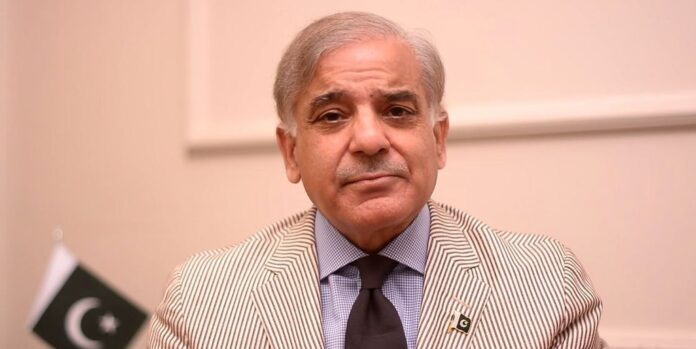Prime Minister Shehbaz Sharif calls for intensified business collaboration and economic ventures in the next phase of the China-Pakistan Economic Corridor (CPEC) during a speech in Karachi
On August 9, 2024, Prime Minister Shehbaz Sharif addressed a gathering of international business leaders and government officials in Karachi, highlighting the next phase of the China-Pakistan Economic Corridor (CPEC) as a pivotal moment for strengthening economic ties between Pakistan and China. The event, held at the Governor House, was attended by the Sindh governor, chief minister, federal ministers, prominent businessmen, and senior officials.
In his speech, Sharif emphasized the need to transition from strong diplomatic relations to deeper economic cooperation. He underscored that the forthcoming phase of CPEC would focus on business-to-business partnerships, particularly in the industrial sector. Sharif highlighted key areas for collaboration, including agriculture, information technology, mining, minerals, and infrastructure.
Embed from Getty ImagesAs an agrarian economy with a substantial rural population, Pakistan aims to enhance its agricultural sector. Sharif pointed out that agricultural exports increased by $3 billion in the fiscal year 2024, with a target set for an additional $7 billion in the current fiscal year. He described this goal as a significant leap forward that would require advanced technology, modern techniques, and best practices. Sharif proposed that China could play a crucial role as a partner in achieving these targets and adding value to Pakistan’s agricultural exports.
The Prime Minister shared insights from his recent visit to China, where he was impressed by the country’s technological advancements and educational institutions. In response, he announced a program to send 1,000 Pakistani students to China for advanced training in agriculture. This initiative aims to enhance Pakistan’s agricultural capabilities by integrating modern practices and innovations learned from China.
Sharif encouraged Chinese investors to engage in business cooperation with their Pakistani counterparts, particularly in the textile and agriculture sectors. He proposed that the next phase of CPEC would facilitate joint ventures and industrial partnerships, focusing on producing and exporting goods to international markets. Sharif suggested that creating a common mechanism for production and export could result in mutual benefits for both nations.
In closing, Sharif highlighted the depth of the Pak-China friendship, noting that it transcends geographical boundaries and extends into space. He proudly mentioned Pakistan’s recent achievement of launching its satellite with the help of China, symbolizing the strong bond between the two countries.
Analysis:
Political: Prime Minister Shehbaz Sharif’s push for enhanced economic ties with China reflects a strategic move to strengthen Pakistan’s position in global trade and investment. By focusing on business-to-business arrangements and joint ventures, Sharif aims to leverage China’s technological and industrial capabilities to boost Pakistan’s economic growth. This approach aligns with Pakistan’s broader foreign policy strategy of deepening ties with major economic powers. The emphasis on CPEC’s new phase could also influence domestic political dynamics, potentially enhancing Sharif’s standing by demonstrating proactive economic leadership.
Social: Sharif’s speech underscores a broader societal shift towards valuing economic cooperation and technological advancement. The plan to send Pakistani students to China for agricultural training highlights a commitment to improving local expertise and fostering a new generation of skilled professionals. This initiative could have significant social impacts, including improved agricultural practices and greater employment opportunities. The focus on modernizing agriculture and other sectors may also resonate with the public’s aspirations for economic development and job creation.
Racial: While the discussion does not explicitly address racial issues, the focus on economic collaboration with China reflects a broader trend of countries seeking strategic partnerships with major global players. In a diverse country like Pakistan, these international relationships can impact various ethnic and regional groups differently, particularly in terms of economic opportunities and development. Ensuring equitable benefits from such partnerships will be crucial in addressing any potential disparities and fostering inclusive growth.
Gender: The economic initiatives outlined in Sharif’s speech, including the emphasis on agricultural development and industrial partnerships, could influence gender dynamics by creating new opportunities for women in these sectors. Women in rural areas, where agriculture is a primary occupation, might benefit from improved practices and increased economic activity. The development of industries and joint ventures could also lead to more diverse employment opportunities, potentially impacting gender equality in the workforce.
Economic: Sharif’s call for enhanced economic cooperation with China highlights the potential economic benefits for Pakistan. By focusing on sectors such as agriculture and industry, the government aims to drive growth and increase exports. The emphasis on CPEC’s new phase, with its focus on business partnerships, could attract significant investment and foster industrial development. The proposed collaboration with China is expected to boost Pakistan’s economic performance and provide a framework for sustainable growth. The successful implementation of these plans will be critical for achieving the targeted increase in agricultural exports and advancing Pakistan’s overall economic development.
